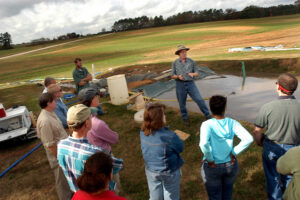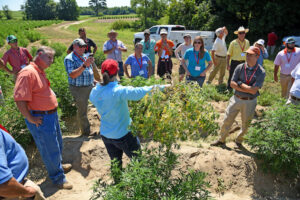Extension Career Pathways
go.ncsu.edu/readext?853100
en Español / em Português
El inglés es el idioma de control de esta página. En la medida en que haya algún conflicto entre la traducción al inglés y la traducción, el inglés prevalece.
Al hacer clic en el enlace de traducción se activa un servicio de traducción gratuito para convertir la página al español. Al igual que con cualquier traducción por Internet, la conversión no es sensible al contexto y puede que no traduzca el texto en su significado original. NC State Extension no garantiza la exactitud del texto traducido. Por favor, tenga en cuenta que algunas aplicaciones y/o servicios pueden no funcionar como se espera cuando se traducen.
Português
Inglês é o idioma de controle desta página. Na medida que haja algum conflito entre o texto original em Inglês e a tradução, o Inglês prevalece.
Ao clicar no link de tradução, um serviço gratuito de tradução será ativado para converter a página para o Português. Como em qualquer tradução pela internet, a conversão não é sensivel ao contexto e pode não ocorrer a tradução para o significado orginal. O serviço de Extensão da Carolina do Norte (NC State Extension) não garante a exatidão do texto traduzido. Por favor, observe que algumas funções ou serviços podem não funcionar como esperado após a tradução.
English
English is the controlling language of this page. To the extent there is any conflict between the English text and the translation, English controls.
Clicking on the translation link activates a free translation service to convert the page to Spanish. As with any Internet translation, the conversion is not context-sensitive and may not translate the text to its original meaning. NC State Extension does not guarantee the accuracy of the translated text. Please note that some applications and/or services may not function as expected when translated.
Collapse ▲Extension Program Assistants assist Extension Agent in implementing Extension programs. Program assistants serve in all Extension programs such as Expanded Food and Nutrition Education Program (EFNEP); Food Stamp Nutrition Education Program (SNAP-ED); agricultural programs; 4-H youth development programs, and others. A high school education is always required and a Bachelor’s degree is often needed for the program assistant career.
Extension Agents are described as the “heart and soul of Cooperative Extension” (Seevers & Graham, 2012, p. 50). Typically, Extension Agents are assigned to serve one county or geographic area of multiple counties. Extension Agents conduct assessments to identify key needs, assets, and opportunities for the community. Using those needs, assets, and opportunities, they set priorities for planning, implementing, and evaluating educational programs. All of the programs are based on translating science for applied solutions to the home, farm, and community. These positions always require a bachelor’s degree and often require a Master’s degree. Extension Agents may have multiple titles depending on the institution – synonyms include Extension Advisor (Gorman, 2018) and Extension Educator (Seevers & Graham, 2012).
Extension Specialists are experts in their field, and they typically have a doctorate in the academic discipline (Gornish et al., 2018). Extension Specialists often work 100% of their time in providing professional development for Extension Agents; conducting Extension programs in concert with other Extension professionals; conducting applied research; securing extramural funding for Extension programming; answering inquiries from Extension professionals and the public; and interpreting research in the form of Extension publications and educational technologies. Some may also have formal research and/or teaching appointments in their respective academic departments (Seevers & Graham, 2012). Specialists are typically on the University tenure and promotion system whereby their promotion and tenure are based on their scholarly performance.
Extension Administrators may serve in various roles at the county, regional, state, or federal levels. A County Extension Director facilitates accountability, performance appraisal, budgeting, facilities, and supervision at the local (county) level (Seevers & Graham, 2012). A Regional Extension Director, for example, would supervise, mentor, appraise and support Extension personnel who worked in a defined geographic area, often a multi-county region of the state. State administrators provide leadership, administration, and budgetary oversight for a statewide Extension program (such as Family and Consumer Sciences) or an entire unit (such as the Department Extension Leader for the University Department of Agricultural and Extension Education). Extension administrators at the regional, state, and federal levels need at least a Master’s degree and often a doctoral degree is required.

Rich McLaughlin, Sediment and Erosion Control Research and Education Facility extension specialist, explains the erosion control simulator at the Lake Wheeler Road test site. photo by Roger Winstead
Organizational Support roles vary greatly and professionals in these roles represent a host of academic disciplines such as program evaluation, public administration, and business management. The careers may include advancement (also known as fund development); information technology; evaluation and program planning; human resources; and organizational learning (also known as staff development). Many Extension organizations have a role for an Organizational Development Leader who supports the professional development of Extension professionals to ensure they are on the cutting-edge of technology, social trends, and the latest research in their respective Extension assignments. While these roles vary, they all share a common goal to support Extension personnel in doing their jobs to their fullest capacity.
To learn more about actual Extension professional job vacancies in North Carolina, visit the NC State Extension Job Vacancy website: https://extensionhr.ces.ncsu.
To learn more about actual Extension professional job vacancies throughout the United States, visit the Extension Jobs website which includes career opportunities in Extension, outreach, research, and higher education: https://jobs.joe.org/
Gorman, M. (2019). Becoming an agricultural advisor – the rationale, the plan, and the implementation of a model of reflective practice in extension higher education. The Journal of Agricultural Education and Extension, 25 (2),179-191. https://10.1080/1389224X.2018.1559742



